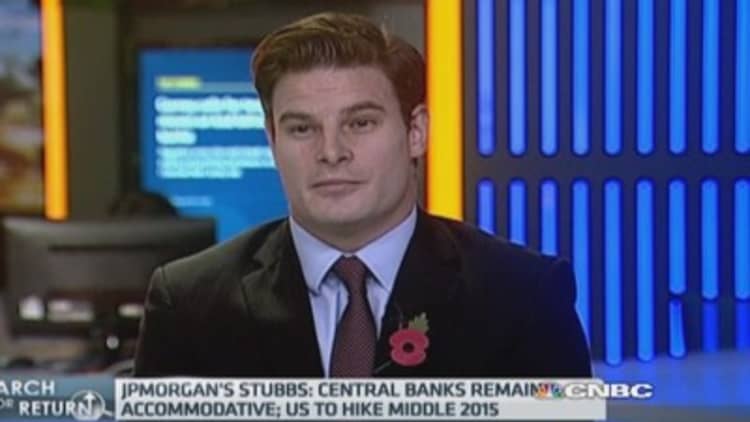It's still too early to raise interest rates given below-target inflation, New York Federal Reserve President William Dudley said, noting there could be a significant benefit from letting the economy run "slightly hot."
Speaking at the Central Bank of the United Arab Emirates in Abu Dhabi on Thursday, Dudley called for "patience" on an increase in the Fed funds rate as the risk of tightening prematurely is greater than the risk of tightening too late. He expects rates to rise sometime next year if economy grows as expected.
Inflation remained subdued in September. Core consumer prices rose 1.7 percent on year, unchanged from August and below the Fed's 2.0 percent target.
Read More OECD cuts US growth forecast, warns on risk assets
Dudley also cited a "meaningful gap" between the current unemployment rate and full employment for his rate outlook.
In October, employment gains topped 200,000 for the ninth straight month – the longest stretch since 1994, while the unemployment rate fell to a six-year low of 5.8 percent. But that remained above the 5.2 percent to 5.6 percent range that the Fed considers full employment.
Markets remain torn over the exact timing of a Fed rate hike. A CNBC survey in October suggested that investors believed the Federal Reserve was becoming more dovish. On average, respondents forecast the first rate hike in July 2015, one month later than in the September survey.
However, a slightly more hawkish tone in the Federal Open Market Committee statement released shortly after the survey – the mention of a "substantial improvement" in the jobs outlook in particular – led many investors to reassess the possibility of a rate hike before July.
Emerging Markets
U.S. policy normalization could create significant challenges for emerging markets, Dudley said, noting it would likely be accompanied by market turbulence.
Read More Moody's: US, UK to outpace faltering global growth
Last year, emerging market assets convulsed after the U.S. Federal Reserve first broached its plan to begin tapering its $85 billion-a-month asset purchase program. This came to be known as the "taper tantrum," with emerging market currencies tumbling as investors started to bring their dollars back to the U.S. in anticipation of higher interest rates.

Dudley acknowledged that the Fed has a responsibility to manage policy in a way that promotes global financial stability, but noted that emerging markets are now better equipped to handle any challenges that arise from changes in Fed policy.
Headwinds
Headwinds dragging the U.S. economy have subsided, allowing Fed policy to work, Dudley said, highlighting to income growth amid job gains and lower energy prices.
Read MoreDefense, shrinking trade gap boost third quarter U.S. growth
However the U.S. economy is not without its challenges, he said, pointing out still-constrained mortgage credit and weak overseas growth.
Slowing growth in the euro zone continues to weigh on the health of the global economy. Growth was flat in the second quarter, below expectations for a 0.1 percent increase. Meanwhile, a 0.2 percent contraction in the German economy – the growth engine of the euro zone, which remained resilient amid much of the region's troubles of the past few years – underscored the potential for continued sluggishness in the region.
Last week Dudley—head of the New York Fed and someone seen as a close ally of Fed Chair Janet Yellen—said markets seemed to be getting the message about a coming rate hike next year.
He has also said recently he would be "" to raise rates next year.



